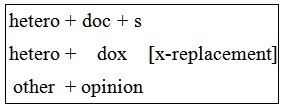
3 前綴 (Prefix)
最常見與h有關的英語前綴總共有四個:hyper-、hypo- 、hetero- 、homo- 。
3.1 hyper- (cf. L. super-)
hyper- 源自於希臘語前綴,加在名詞或形容詞之前,表示「高於;在…之上;超越 (over, above, beyond)」等意思。 例如:hypersonic (adj. 超音速的)、hypertension (n. 高血壓)。
hypersensitive /ˋhaɪpɚˋsɛnsətɪv /
adj. oversensitive 過敏(症)的;過度敏感的

【推測詞義】感覺過度的;高度敏感的。
【多餘後綴】由於後綴 (suffix)決定一個詞的詞性, -ive已經是形容詞的後綴,所以前面所添加的形容詞後綴 -it是多餘的,因此itive中的 -it被稱為多餘的後綴 (redundant suffix)。
*hyperbole / haɪˋpɝbəlɪ /
n. a description which is exaggerated above reality;extreme exaggeration;overstatement 【修辭】誇張法;誇張的措辭

【推測詞義】投擲過遠,超過原射程。用在修辭上是以鋪張渲染的文辭,故意使用言過其實的大膽修飾法,以刺激讀者,加深印象,強化效果。
【衍生詞】hyperbolic adj. using hyperbole;excessive;exaggerated 誇張的
【常用句子】 “You can’t get blood out of stone” is a good example of hyperbole. (「石頭擠不出鮮血來(比喻吝嗇之人不會施捨)」是一個很好的誇張法例子)
【常用誇張法的諺語】 a) A storm in a teacup (茶杯裡的暴風雨))
比喻「小題大作」(茶杯能容得下暴風雨嗎?)
b) A cat has nine lives. (貓有九條命)
比喻「生命力頑強,不容易被打倒」 (貓真的有九條命嗎?)
c) Burn not your house to frighten the mouse away. (不要為了嚇跑老鼠而燒房子)
比喻「勿因小失大」 (為了嚇跑老鼠而燒屋子的作法違背常理)
3.2 hypo- (cf. L. sub-)
hypo- 源於希臘語前綴,加在名詞或形容詞之前,表示「低於;在…下方;比正常少 (under, beneath, below normal)」等意思。 例如:hypotension (n. 低血壓)、hypodermic (adj. 皮下的;皮下注射的)。
*hypocrite /ˈhɪpəˌkrɪt/
n. one who says or does one thing while thinking or feeling something entirely different underneath;pretender 偽善者;偽君子

【推測詞義】只敢在下面評判,不敢公開評判他人的小人。偽善的行為,則用hypocrisy。
【衍生詞】 hypocritical adj. pretending to be virtuous;deceitful 偽善的;偽善者的;虛偽的
hypocrisy n. acting in contradiction to what one professes偽善;虛偽
*hypothesis /haɪˈpɑθəsɪs/
n. a tentative assumption subject to proof;an unproved theory, proposition, supposition, etc. tentatively accepted to explain certain facts 假說;假設;前提

【推測詞義】將論點放在下方,表示對該論點沒有把握而不敢提出,只能稱為「假說,假定」。
【衍生詞】hypothetical adj. based on assumptions or hypotheses;assumed;presupposed 假說的,假設(性)的
【常用片語】 a) (to) venture a hypothesis (大膽提出假設)
b) (to) verify a hypothesis (證實某一假設)
3.3. hetero- (Greek)
【來源】前綴hetero- 源於希臘語,其意為「相異的、不同的、其他的 (different, other)」,與homo- 意思相對。
【變體】為維持最佳音節結構(VCVC),其後若接以母音為首的詞根,則前綴hetero- 的母音o必須刪除,若在其他情況下,則維持hetero- 。
hetero- → heter- / ___ + vowel
hetero- → hetero- / elsewhere
*heterodox /ˈhɛtərəˌdɑks/
adj. not orthodox;not conforming to accepted opinions or beliefs, especially in religion;heretical;iconoclastic;subversive 異端的;異教的;非正統的

【推測詞義】其他的意見,不同於正統意見的。
【衍生詞】heterodoxy n. the quality or fact of being heterodox異端;異教;異說;非正統(的學說)
【相反詞】orthodox adj. pertaining to accepted opinions 正統的;傳統的
【常用片語】heterodox ideas (非正統的思想)
*heterogeneous /ˌhɛtərəˈdʒinɪəs/
adj. dissimilar;diverse;varied;incongruous 不同的;異種的;異質的:made up of different kinds of people or things;miscellaneous 不同成分構成的

【推測詞義】不同種類的,不同種類之物所構成的。 -ous是一個表「有…性質的(having the nature of)」的形容詞後綴。
【衍生詞】heterogeneity n. composition from dissimilar parts;disparateness 異種;異質
【相反詞】homogeneous adj. not heterogeneous同種的
【常用句子】China has a very heterogeneous population. (中國人是由不同的種族所構成。)
3.4 homo- (Greek)
【來源】前綴homo- 源於希臘語,其意為「相同的、相似的、類似的(same, similar, alike)」,與hetero- 意思相對,如homosexual (adj. 同性戀的;n. 同性戀者) / heterosexual (adj. 異性戀的;n. 異性戀者)
【變體】為維持最佳音節結構(VCVC),其後若接以母音為首的詞根,則前綴homo- 的母音o必須刪除,若在其他情況下,則維持homo- 。
homo- → hom- / ___ + vowel
homo- → homo- / elsewhere
【例】homonym /ˋhɑmə͵nɪm /
n.. a word pronounced the same as another but differing in meaning, whether spelled the same way or not 同形同音異義詞(homophon) (如:bear 與 bear 、way與weigh、to與too,two)

【推測詞義】相同的名字
*homogeneous /homəˈdʒinɪəs/
adj. of the same kind;uniform;similar or identical 同種的;同質的;同類的;相似的;composed of similar kinds 由相同或相似種類之物所組成的

【推測詞義】同一種類的。
【衍生詞】homogeneity n. quality of being alike;invariability 同種;同質(性)
【常用片語】Japan’s homogeneous society (日本的同質社會)
4 其他與字母H相關的重要詞彙
hallmark /ˈhɔlˌmɑrk/
n. a mark of genuineness, good breeding, or excellence (金、銀製品的)純度檢驗證明印記;a distinctive feature (任何商品上的)特點,特徵 (≠ uncharacteristic feature)
v.to stamp with a hallmark 蓋上純度檢測證明印記;附上品質保證書於;to mark as dinstinctive 使具有…特點

【推測詞義】源自18世紀倫敦的金匠工會(Goldsmiths’ Hall),金、銀器都需在此通過測試並蓋上官方認證章(mark),否則就不能合法販賣。
*haphazard /ˌhæpˈhæzɚd/
adj. dependent upon chance;by accident;without plan;chancy;random;indiscriminate 偶然的;隨意的;無計畫的

【推測詞義】靠運氣在骰子賭博中贏得勝利,這種勝利純粹是偶然的。
【衍生詞】 hap n. chance;luck;lot 運氣;機緣
hapless adj. unfortunate;unluckly 不幸的
【常用句子】Haphazard answers are usually wrong. (隨意的答覆往往是不對的。)
hardheaded /hɑrdˋhɛdɪd /
adj. shrewd and unsentimental;practical (於買賣生意)現實的;精明冷靜的;stubborn;obstinated;dogged 頑固的;死腦筋的
【常用片語】a hardheaded businessman (精明的商人)
【複合形容詞】[Adverb-verb(-ed)] 可構成複合形容詞(compound adjectives),如well-behaved (adj. 行為端正的)、hard-bitten (adj. 頑強的;不屈的)、quick-frozen (adj. 急速冷凍的)
*harmonious / hɑrˋmonɪəs /
adj. agreeable;congruous;accordant;cooperative 協調的;調和的;(音樂)悅耳的;friendly and peaceful (關係等)友好和睦的;融洽的

【推測詞義】以讓人愉快的形式連接起來。
【衍生詞】harmony n. agreement 相符;一致;a pleasing combination of related things 協調;勻稱
【常用片語】 a) a harmonious atmosphere (融洽的氣氛)
b) a harmonious melody (悅耳的旋律)
*hazardous /ˈhæzɚdəs/
adj. risky;dangerous;perilous, precarious 有風險的;有危險的;chancy;fortuitous;haphazard 靠運氣的;偶然的

【推測詞義】源自中古法語hasardeux,往上追溯為阿拉伯語的al zahr (game of chance played with dice),指擲兩個骰子比大小靠運氣的賭博遊戲,這種遊戲賭注下的愈大,風險就愈大。
【衍生詞】hazard n. risk;peril;danger 危險;chance, or a chance occurrence 運氣;偶然
【常用句子】 a) His whole fortune was on the hazard. (他的全部財產岌岌可危。)
b) The old captain led a life full of hazards. (老船長度過充滿危險的一生。)
hedonist /ˋhidnɪst /
n. a person who seeks pleasure above other values;epicurean 享樂主義者

【推測詞義】「甜」帶有「享樂」之意,追求甜蜜之人,就是追求享樂之人。
【衍生詞】 hedonistic adj. self-indulgent;living a life of pleasure 享樂主義的 (≠ascetic adj. 苦行的)
hedonism n. belief that pleasure is the sole aim in life 享樂主義
【常用句子】Hedonism and asceticism are opposing philosophies of life. (享樂主義與禁慾主義代表對人生完全不同的看法)
heretical /həˈrɛtɪkḷ /
adj. of heresy or heretics;unorthodox;iconoclastic 異教(徒)的;異端(者)的;持非正統觀點的

【詞源探索】源自中古法語heretical,往上追溯到希臘語,意指「所作的選擇」,後來使徒保羅把名詞heresy用於指企圖分裂基督教整體統一的分離份子,此後凡選擇信奉悖離正統教會所主張之教義都稱為異教徒或異端者。
【衍生詞】 heresy n. opinion contrary to accepted religion;opinion contrary to popular belief 異教;異端邪說
heretic n. person who believes contrary to his church or established belief;nonconformist 異教徒;持異端邪說者
hidebound /ˈhaɪdˌbaʊnd/
adj. obstinately conservative and narrow-minded;not willing to change habits or ideas;illiberal;bigoted; inflexible (人、思想)偏狹的;心胸狹窄的;十分保守的;頑固守舊的

【推測詞義】hide當名詞用,意思是「獸皮(蓋在表面上的皮)」。 原意是牛的皮膚緊緊貼著背骨與肋骨,也就是(家畜等因營養不良)瘦到只剩皮包骨),後來隱喻為因保守而使思想深藏緊閉,不知變通。
hideous /ˈhɪdɪəs/
adj. very ugly 醜陋的;horrible to see;offensive to the senses;dreadful;terrifying;frightful;ghastly 不忍卒睹的;可怕的;令人毛骨悚然的

【推測詞義】害怕的,令人膽顫心驚的。
【聯想】太醜了,只好藏起來(hide)。
*hinge /hɪndg/
n. a piece of metal used to join a door to its frame (門的)鉸鏈;a pivotal point or principle on which everything depends 關鍵
v. to attach or join as by a hinge (門等)靠鉸鏈來轉動(或接合);to depend or turn on 取決於;依...而定

【推測詞義】(門等)靠懸掛之物(鉸鏈)來開或關。
【常用片語】(to) hinge on (依…而定;取決於)
【常用句子】The result hinges on his reply. (結果取決於他的答覆)
*hint / hɪnt /
n. a slight sign or indication;indirect suggestion 暗示;示意;細微的跡象;a useful suggestion or piece of advice (常用複數)有益的意見;心得

【推測詞義】能抓住的一點東西
【常用片語】 a) helpful hints (有益的意見)
b) hints on cooking (對烹飪的心得)
【常用句子】He gave me a hint. (他給我一個暗示。)
hostile /ˈhɑstḷ /
adj. showing enmity;adverse;antagonistic 懷有敵意的;敵對的;反對的;not hospitable;unfriendly;unfavorable不友善的

【推測詞義】源自於拉丁語hostis,意思是「外人;陌生人;敵人(stranger, enemy)」。 具有陌生人或敵人性質的。 -ile是一個表「具有…性質的(having the nature of)」的形容詞後綴。
【衍生詞】hostility n. unfriendliness 不友善;敵意
【常用片語】 a) a hostile army (敵軍)
b) a man hostile to war (反戰之人)
c) (to) abandom hostility (放棄敵意)
【常用句子】They are hostile to the reform. (他們反對改革。)
hysterical /hɪsˈtɛrɪkḷ /
adj. very upset;over-excited;emotionally uncontrolled and wild 歇斯底里症的;情緒異常興奮的

【推測詞義】子宮病的。因子宮機能失調,女子較男子更容易情緒激動。
【衍生詞】hysteria n. excessive or uncontrollable emotion, such as fear or panic 【醫學】歇斯底里;情緒異常或過度激動






 留言列表
留言列表